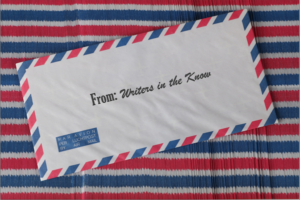Many writers familiar with NaNoWriMo (National Novel Writing Month) have a complicated relationship with the number 1,667. That’s how many words one must write each day for 30 days in order to hit the goal of writing 50,000 words in a month. Some writers blow right past that number every day of the year in their sleep—and, kind of annoyingly, like people who do CrossFit, they won’t hesitate to work their generative abilities into conversation or humblebrag about their daily word counts on social media. For others, that number is too far out there, and missing that goal time and time again becomes demoralizing and demotivating, as does comparing their output with that of those high-daily-word-count superstars.
Should You Do NaNoWriMo?
I bring this up not to discourage anyone from participating in NaNoWriMo. Rather, it’s to encourage you to consider how the challenge can help you grow as a writer. The short-term and extrinsic rewards are definitely worth it: bragging rights, a sense of personal accomplishment, fun swag, and opportunities to meet other writers during in-person and online write-ins. But the long-term benefit is what you’re really after. NaNoWriMo is about creating a brain change. It’s psychological. It’s about fostering the practice of turning off the analytical, judgey, editor part of your mind so that your creative mind can more effectively and efficiently do its job. You need both, but you need to learn how to let them take turns.
That brain change is more important than 1,667.
Yesterday, I came across an excellent Facebook post by my friend, prolific science-fiction author James Van Pelt. With his permission, I’m sharing his thoughts and experience with with setting daily word-count goals with you here.
James Van Pelt says:
“When I finished grad school in 1990, I set myself the goal of 1,000 words a day (because I’d read that’s what Stephen King did). I was teaching high school English full time and raising a family. If I was on a roll, a thousand words could take an hour. Unfortunately I wasn’t on a roll all the time, and that one hour could stretch into four. Obviously I couldn’t get a four-hour session in with the rest of my schedule, so what happened is that if I didn’t think I could hit the 1,000 I wouldn’t write at all.
“This was disturbing.
“At the end of the year I would tally my words. The number was always disappointingly low, and a low-grade self loathing lingered for weeks.
“I’m a slow learner. It took me until 1999, when at the end of the year my total looked like it would be around 35,000 words that I decided the problem wasn’t in my motivation or will power; it was the damned 1,000-word goal. It was just too much.
“I asked myself what I needed to be happier. I was going to be finishing the year at 35,000 words. Would I be happier if I did twice that much? Sure, way happier! The math on a 70,000 word year is about 200 words a day. That’s less than a page. That’s one conversation or setting description or moment of action. I could do 200 words before school started or during lunch/planning period, or during a staff meeting (plus it looked like I was taking notes).
“This was a doable goal, but it would only work if I didn’t skip days like I did with the 1,000-word goal. So, starting in November of 1999 I’ve been writing 200 words or more a day. If I’m on the road or at a convention, I’ll write at 5:30 in the morning or in the last half hour before going to sleep. What I try to do is not tell the people in my life, “Sorry, can’t join you. I have to write.” I haven’t missed once.
“Different systems work for different people. This is what works for me. I like streaks and they motivate me. I’ve written and sold a lot of fiction since 1999 and I always carry that pleasant buzz of knowing that I’ve written recently, and that I’m going to be writing soon.
“Between living a creative life or thinking that I’ll lead a creative life someday, I choose the first one.”
Connect with James Van Pelt on Facebook or check out his website.
Your Best Daily Writing Goals
Setting goals is important. Studies across all disciplines tell us over and over that people who set goals and then use those goals to guide the ways in which they spend their time are far more likely to accomplish desired outcomes than those who don’t. Furthermore, we know that breaking long-term goals down into digestible chunks is a key to success. As you make a plan for NaNoWriMo, or for next year, or for your next big writing project, or whatever, here are some ways to approach setting goals that are right for you.
Start by observing your writing habit.
Before you set word-count goals, spend two or three typical weeks writing when you can at a pace that feels like something you can sustain. These should be weeks representative of your life in terms of work, family, chores and errands, and other non-writing responsibilities. Don’t choose weeks that you are on vacation, laid up with a broken leg, entertaining your in-laws, or dealing with an unexpected project or crisis. At the end of those weeks, tally your total word count and tally the total hours you spent writing. Which makes you feel more positive about your efforts?
Decide whether to track word count, time spent, or both.
Some writers, like James, have dialed in to a realistic, sustainable daily word count. But there are others who find greater success tracking time spent. You can also track both! If you do, pay attention to the ratio of time to words when you’re drafting versus when you’re plotting or revising. These will not be the same ratios. You might be a writer who tracks word count when drafting and time spent when revising. Whatever the case, having a solid idea of your volume and rate of output under various circumstances will help you over time to develop even more realistic goals.
Practice positive self-talk based on what’s realistic and sustainable.
You’re going to get derailed. You just are. Suddenly you’re not putting gold-star stickers on that progress chart you made back at the beginning of the project or coloring in the “I did it!” squares in your bullet journal anymore.
When that happens, adjust. Instead of thinking “great, now I have to double my output tomorrow, and that probably won’t happen, so then I’ll need to triple my output two days from now, and that’s never going to happen,” take a realistic look at your calendar and set new goals for the next three, seven, ten, or X-number of days. A gold star or checkmark is still a gold star or checkmark, regardless of whether the goal was 2,000 words or 200.
Another strategy: Switch from a word-count goal to a time-spent goal or vice versa. That way, your self-talk switches from the negative “no way can I write 2,000 words tomorrow” to the positive “it’s not realistic for me to write 2,000 words tomorrow, but it is realistic to spend 30 minutes with my fingers on the keyboard before work tomorrow.”
Off track? Look back before looking ahead.
If you feel like you’ve fallen so far behind in your daily progress that you need to adjust your final deadline, don’t make a new plan for moving forward until you’ve looked backward. What derailed you? Was it something within your control, like spending too much time scrolling through social media or saying yes to projects or favors you could have said no to? Or was it something outside your control, like an unexpected work trip or a sick child?
Either way, I have good news. If it’s the former, make a list of all time-sucking behaviors that derailed you, and then make a plan for saying no. No to wasting time staring at screens. No to Aunt Betty who wants you to help her alphabetize her recipe cards. Yes to yourself and your goals.
If it’s the latter, recognize that the hiccup is temporary. Depending on the severity of the crisis, it might not feel temporary, or you might not know when your life will be back to normal, if ever. Again, it’s time to adjust. Do you need a break from the project? Take one! But schedule it. Make a date with yourself, even if it’s only one hour next Saturday afternoon, to keep your head in the game. If you’re used to getting two or three hours a day to write, but suddenly that can’t happen, adjust. Try writing in ten- or fifteen-minute increments. Try writing three sentences instead of three pages. All progress is progress.
At the end of the day, writing is hard, whether it’s your full-time job, part-time job, or avocation. Setting goals is important, but so is setting the right kinds of goals for you, at the right time in your life. Be flexible and positive, and keep your focus on what is realistic and sustainable, not for anyone else, but for you.
Photo by MART PRODUCTION from Pexels










